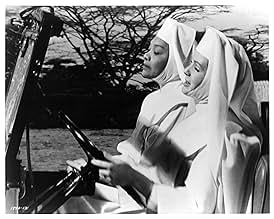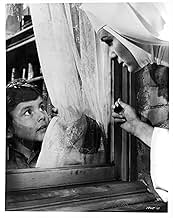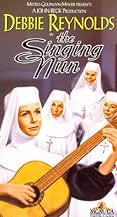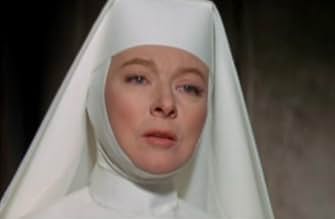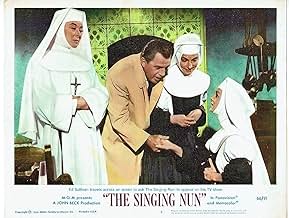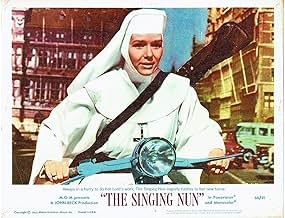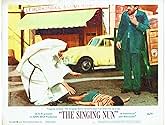IMDb-BEWERTUNG
6,1/10
1622
IHRE BEWERTUNG
Füge eine Handlung in deiner Sprache hinzuFanciful biography of the Belgian nun who briefly made the hit parade.Fanciful biography of the Belgian nun who briefly made the hit parade.Fanciful biography of the Belgian nun who briefly made the hit parade.
- Für 1 Oscar nominiert
- 1 Gewinn & 3 Nominierungen insgesamt
Empfohlene Bewertungen
Despite the best efforts of the actors, this movie is awful. The screenplay can only be described as moronic. I appreciate that it is the songs that draw people to watch it, but if so, do stick to the record.
It's a shame too because Debbie Reynolds, Greer Garson, Ricardo Montelban, Katherine Ross, Agnes Moorehead, Chad Everett all do as well as can be expected - and I am reminded of how wonderful a singing voice Debbie Reynolds has. Moreover, Montelban is truly believable as a priest - as are Garson and Reynolds as nuns. Ross is just fine.
But this is more saccharine than most of the Flying Nun episodes. It's strange too - because most movies about nuns have for some reason been quite good - Black Narcissus, Heaven Knows Mr. Allison, The Nun's Story, The French movie, Therese, The Song of Bernadette, even The Trouble with Angels (which bowled me over with how affectingly it evolved).
Most movies succeed in the writing - this one had a great real story to tell - even without emphasizing the astonishingly grim post-convent life of its protagonist -- from her family's life in Paris during W.W.II (her father a figure in the Resistance) to the fascinating relationship with music. (Think of how fantastically the movie Hilary and Jackie showed a woman's conflicts about having her life revolve around music).
When I was a boy, Sister Soeur's songs were the leitmotif of our Catholic grade school - we all had to learn them in French, sing them in Christmas concerts for our parents, etc. It's such a shame that such an awful movie celebrates such light, cheery music. It's truly not worth watching.
It's a shame too because Debbie Reynolds, Greer Garson, Ricardo Montelban, Katherine Ross, Agnes Moorehead, Chad Everett all do as well as can be expected - and I am reminded of how wonderful a singing voice Debbie Reynolds has. Moreover, Montelban is truly believable as a priest - as are Garson and Reynolds as nuns. Ross is just fine.
But this is more saccharine than most of the Flying Nun episodes. It's strange too - because most movies about nuns have for some reason been quite good - Black Narcissus, Heaven Knows Mr. Allison, The Nun's Story, The French movie, Therese, The Song of Bernadette, even The Trouble with Angels (which bowled me over with how affectingly it evolved).
Most movies succeed in the writing - this one had a great real story to tell - even without emphasizing the astonishingly grim post-convent life of its protagonist -- from her family's life in Paris during W.W.II (her father a figure in the Resistance) to the fascinating relationship with music. (Think of how fantastically the movie Hilary and Jackie showed a woman's conflicts about having her life revolve around music).
When I was a boy, Sister Soeur's songs were the leitmotif of our Catholic grade school - we all had to learn them in French, sing them in Christmas concerts for our parents, etc. It's such a shame that such an awful movie celebrates such light, cheery music. It's truly not worth watching.
I was a very young Catholic school student when this movie came out (see my comments about the TV show "The Flying Nun"). At the time, it was STRONGLY suggested by the sisters teaching us that we go to see this movie. It was playing right down the street. At the time, it seemed so light and breezy, and the music was so in tune with what we were being taught. Of course, since then, A LOT has happened, and the true-life story of the real "Singing Nun" took such a bizarre turn and ended in such weird fashion, that I think I'd have a hard time watching this version now.
If you want to know about the story of the only singer who got a huge hit in the French language in 1963-64 in the USA,this is not the place to look ; you should rather take "Soeur sourire " (=sister smile) (2009) starring Cécile De France which tells the whole bio,warts and all.
Soeur Sourire was not the person depicted in this vehicle for Debbie Reynolds ;she was a tomboy and enjoyed football games (you see her playing in the movie) ,but she loved girls -she became a nun because of that-, she was deprived of her income by her covent , she was released of her vows ,she fell prey to the gossip papers ; she was a clever woman ,who tried to resume her career and she wrote songs much superior to her famous "Dominique"but attacking the Catholic Church ; she ended her life with a woman ,coming to terms with her homosexuality ;both were ruined and committed suicide.
When she entered the covent,Soeur Sourire was a fan of American rock and roll ,and she considered music as a way to get religious messages across :why not ?Presley, Dion , Harrison , Van Morrison ,Aretha Franklin, to name but five, had their God songs too ....This side (with Ricardo Montalban as the priest who stands by her ) is only skimmed over.
If you consider the movie pure fiction ,it's pleasant to watch :nice colors ,lilting voices,delightful cast and credits in which the nun rides on the staves ,scenes a la "sound of music" , and it's a pleasure to see Greer Garson as mother superior , Agnès Moorehead and the rare Juanita Moore (the unforgettable black mom in Sirk's "imitation of life" )as nuns and Ed Sullivan as himself in a for once true event of the singing nun's short-lived career .
But all that concerns Katherine Ross and her kid brother Dominique (sic) comes from the screenwriters' imagination! So is Reynolds' and Moore's last scene.
Soeur Sourire was not the person depicted in this vehicle for Debbie Reynolds ;she was a tomboy and enjoyed football games (you see her playing in the movie) ,but she loved girls -she became a nun because of that-, she was deprived of her income by her covent , she was released of her vows ,she fell prey to the gossip papers ; she was a clever woman ,who tried to resume her career and she wrote songs much superior to her famous "Dominique"but attacking the Catholic Church ; she ended her life with a woman ,coming to terms with her homosexuality ;both were ruined and committed suicide.
When she entered the covent,Soeur Sourire was a fan of American rock and roll ,and she considered music as a way to get religious messages across :why not ?Presley, Dion , Harrison , Van Morrison ,Aretha Franklin, to name but five, had their God songs too ....This side (with Ricardo Montalban as the priest who stands by her ) is only skimmed over.
If you consider the movie pure fiction ,it's pleasant to watch :nice colors ,lilting voices,delightful cast and credits in which the nun rides on the staves ,scenes a la "sound of music" , and it's a pleasure to see Greer Garson as mother superior , Agnès Moorehead and the rare Juanita Moore (the unforgettable black mom in Sirk's "imitation of life" )as nuns and Ed Sullivan as himself in a for once true event of the singing nun's short-lived career .
But all that concerns Katherine Ross and her kid brother Dominique (sic) comes from the screenwriters' imagination! So is Reynolds' and Moore's last scene.
The film is somewhat syrupy and a bit simplistic, but correct in most essentials and, after all, quite entertaining. The music, of course, is the best thing about it...quite uplifting. "Raindrops" is my particular favorite, but the duet on "Beyond the Stars" is excellent as well. Miss Reynolds' voice is more than adequate to do justice to the music, most of which (I see from the Soundtrack listings) Sister Sourire wrote herself.
In the early 60's, a nun, calling herself The Singing Nun, released an album of musical hymns and religious songs that turned out to strike a chord with the public. Just about everyone alive in that era still can recognize the strains of Dominique. Naturally, Hollywood chose to make her story into a movie. What they actually did was make an idealized story into a movie, pretending it is the true story. As such, the story comes off as syrupy and too much everyone's fantasy of the perfect nun. She wants only to work with children; she thinks of nothing but her service to the church, she actually rails against abortion in the film. This makes the movie plodding and very boring in places. It also projects a too-virginal image that gets old very quickly. And, for some reason they felt the need to have an old flame to the pre-habit days around to spice things up just a bit, though she remains true to her faith throughout.
The true story is of Jeanine Deckers, known to the world mostly at Soeur Sourire ("Sister Smile"), who called the film "a film of fiction". In the convent she was known as Sister Luc-Gabrielle and did not like the Sister Smile moniker the record company came up with. In contrast to the perfection of the movie, Jeanine Deckers was a very conflicted personality who did not like the attention of the world and definitely did not hold an attraction to a male record producer as shown in the film. In fact, she left the order in 1965, accompanied by her lover, Annie Pescher, whom she stayed with until their mutual suicide pact in 1985. Gee, if you were an old Dominique fan, I probably burst a few bubbles there.
What I think is interesting is that the true story would probably be the Hollywood choice were it made today. The 1965 film portrayed perfection and idealism. I'm sure a 2002 film would search for the seediest of details and revel in her contradictions. What is sad is that neither version would make a very good film. The excessively sweet Debbie Reynolds/Recardo Montalban version is mostly pretty dull and the true story would undoubtedly resemble yet anther VH1 Behind the Music.
Watch for Katherine Ross in her first year as an actress as about the only real character in the film. The Ed Sullivan cameo is rather interesting as well.
The true story is of Jeanine Deckers, known to the world mostly at Soeur Sourire ("Sister Smile"), who called the film "a film of fiction". In the convent she was known as Sister Luc-Gabrielle and did not like the Sister Smile moniker the record company came up with. In contrast to the perfection of the movie, Jeanine Deckers was a very conflicted personality who did not like the attention of the world and definitely did not hold an attraction to a male record producer as shown in the film. In fact, she left the order in 1965, accompanied by her lover, Annie Pescher, whom she stayed with until their mutual suicide pact in 1985. Gee, if you were an old Dominique fan, I probably burst a few bubbles there.
What I think is interesting is that the true story would probably be the Hollywood choice were it made today. The 1965 film portrayed perfection and idealism. I'm sure a 2002 film would search for the seediest of details and revel in her contradictions. What is sad is that neither version would make a very good film. The excessively sweet Debbie Reynolds/Recardo Montalban version is mostly pretty dull and the true story would undoubtedly resemble yet anther VH1 Behind the Music.
Watch for Katherine Ross in her first year as an actress as about the only real character in the film. The Ed Sullivan cameo is rather interesting as well.
Wusstest du schon
- WissenswertesThis movie is loosely based on the true story of Soeur Sourire, who had a #1 pop hit in America with "Dominique" in 1963. Unfortunately, the nun was a one-hit wonder whose life did not continue happily after her chart success. After leaving the church for a full-time music career, she ran into heavy financial problems and eventually took her own life in Belgium in 1985.
- PatzerThe song Dominique was not dedicated to the little boy Dominic, Sister Ann was friends with in the movie, but to Saint Dominic, the founder of the Dominican Order. This goof was added in the movie because the Catholic church was against Sister Ann's career, which is why the movie tells a fictionalized story.
- Zitate
Father Clementi: Your songs, your music, don't you think you've won a great victory through them?
Sister Ann: What kind of victory, Father, if I've lost myself winning it?
- VerbindungenFeatured in MGM/UA Home Video Laserdisc Sampler (1990)
Top-Auswahl
Melde dich zum Bewerten an und greife auf die Watchlist für personalisierte Empfehlungen zu.
- How long is The Singing Nun?Powered by Alexa
Details
- Erscheinungsdatum
- Herkunftsland
- Sprachen
- Auch bekannt als
- Dominique
- Drehorte
- Produktionsfirma
- Weitere beteiligte Unternehmen bei IMDbPro anzeigen
Box Office
- Bruttoertrag in den USA und Kanada
- 8.284.000 $
- Laufzeit
- 1 Std. 37 Min.(97 min)
- Seitenverhältnis
- 2.35 : 1
Zu dieser Seite beitragen
Bearbeitung vorschlagen oder fehlenden Inhalt hinzufügen


